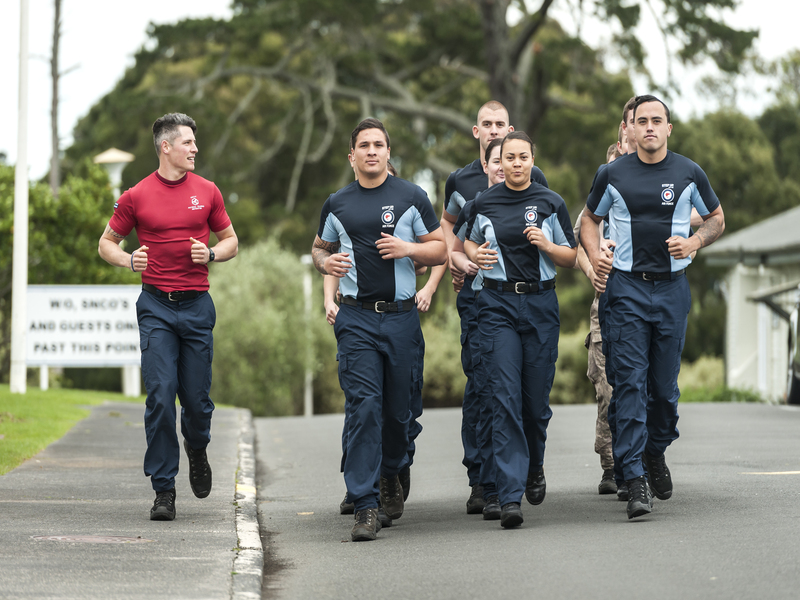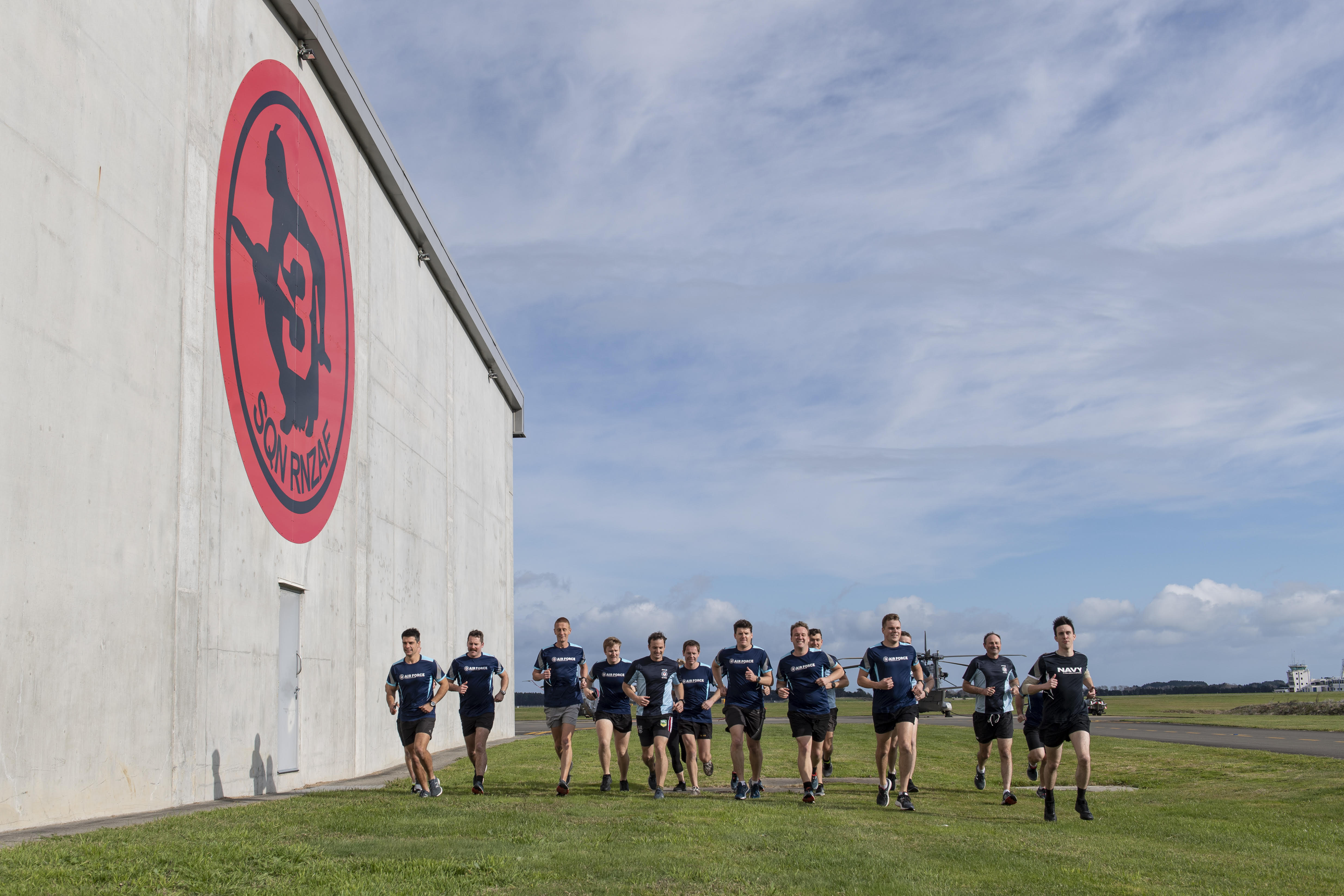Air Force Service Testing
Air Force service personnel are required to achieve and maintain minimum levels of fitness to help maintain a high level of operational readiness.
The Royal New Zealand Air Force (RNZAF) requires all personnel to achieve a minimum level of physical fitness. Personnel of all trades and ranks must meet these standards to ensure the service maintains flexibility to meet all potential operational commitments with minimal preparation times.
For these reasons the RNZAF provides Physical Training Instructors (PTIs), along with a wide variety of facilities and activities, to enable and encourage personnel to maintain an active and healthy lifestyle. The goal of Air Force fitness training is to motivate personnel to participate in a year-round physical conditioning programing that emphasizes total fitness, to include proper aerobic conditioning, strength, mobility, recovery and injury prevention.
Fitness standards are maintained through a two-pronged approach where members are encouraged and enabled to participate in regular physical training in formal and informal sports activities; and regular fitness testing. In addition to the direct benefits of maintaining standards, fitness-orientated activities also assist in developing the teamwork, esprit de corps, leadership, discipline and cross-functional networking that are essential to military service.
RNZAF Operational Fitness Test (OFT)
The Operational Fitness Test (OFT)
The OFT determines whether an Air Service member is operationally deployable. It is conducted regularly to ensure service members maintain an adequate level of fitness to be operationally effective.
The test is designed to reflect deployed conditions, be challenging but achievable for all personnel, detect any physical fitness deficiencies that would affect performance on operations, be easily administered, and be safe. It is based on typical deployment tasks such as erecting large tents, filling sandbags, building defensive barricades, digging foxholes, constructing outdoor latrines and showers, loading and unloading stores, carrying stretchers and conducting ground defence patrols.
OFT Protocols
PTI staff will provide all testing equipment at the testing location. PTIs will conduct a warm up prior to the commencement of the test.
| 1. | Dress | Standard physical training clothing - shorts, t-shirt and sneakers. Commanding Officer's have the discretion to direct operational uniform. |
| 2. | Continuous Push-Ups |
Purpose. To provide a reliable indication of upper body and abdominal muscular endurance required for general duties. Test. Press-ups are to start from the front support position. Hands are to be placed outside the shoulder width with the point of the thumb in line with the outer edge of the shoulder line and the feet no wider than hip width apart. The body is to be lowered to a position where the line across the upper arms, from the outside of the elbow to the top of the shoulder, is at least horizontal to the ground, then raised by straightening the arms back to the start position keeping the body straight throughout. Complete as many repetitions as possible at a continuous rate with no time limit. Note. The PTI will give a warning if press ups are not completed correctly and cease the exercise when the participant has achieved maximum effort. |
| 3. | 5km Weighted March | Purpose. Represents the operational requirement to carry personal protective equipment for long distances. The weighted vest simulates the helmet, flak jacket, service-issued weapon, 120 rounds of ammunition, webbing, 1.5L water and a first aid kit. Test. Personnel to commence march as indicated by the PTI. Participants are to walk, shuffle or run unassisted for the duration of the course wearing their weighted belt. |
Air Force fitness testing tables
Air Force Operational Fitness Test - Male
| Pass grade | Age Group | Press Ups | 5km March (mins) |
| F1 | 16-29 | 40 | 42.00 |
| F1 | 30-39 | 33 | 44.00 |
| F1 | 40-49 | 28 | 46.00 |
| F1 | 50+ | 22 | 48.00 |
| F2 | 16-29 | 30 | 44.00 |
| F2 | 30-39 | 23 | 46.00 |
| F2 | 40-49 | 18 | 48.00 |
| F2 | 50+ | 12 | 50.00 |
Air Force Operational Fitness Test - Female
| Pass grade | Age Group | Press Ups | 5km March (mins) |
| F1 | 16-29 | 22 | 44.30 |
| F1 | 30-39 | 18 | 46.30 |
|
F1 |
40-49 | 16 | 48.30 |
| F1 | 50 | 12 | 50.30 |
| F2 | 16-29 | 16 | 46.30 |
| F2 | 30-39 | 13 | 48.30 |
| F2 | 40-49 | 11 | 50.30 |
| F2 | 50+ | 8 | 52.30 |

General training advice
Testing times
Contact your nearest gym for their weekly testing schedule, or check when your next unit test is planned.
Whenuapai | Ohakea | Trentham | Woodbourne
Worried about failing?
Fitness testing occurs yearly. To ensure you are meeting the fitness requirements throughout the year, it is important to train consistently. Individuals receive a reminder if their fitness test is coming up one month prior. It is strongly encouraged that individuals have a good understanding of their overall health, and not overtrain leading up to the fitness test.
What happens if I fail my Operational Fitness Test?
If you fail your fitness tst you will be expected to retest and pass this within 28 days from the date of failure to achieve a satisfactory fitness standard. If at the end of the 28 day period you have still not achieved a satisfactory fitness standard, you will be issued a formal warning detailing three months to achieve the required standard and attend compulsory Return to Readiness (R2R) Training.
Each person on R2R training will be monitored throughout the programme at supervised sessions. It is not compulsory but recommended that all personnel attend R2R as soon as possible after they have failed the OFT. The success rate of those personnel training under guidance is much greater than of those that undertake their own remedial training.
How can NZDF provide support for you?
NZDF Managers. If you are having problems keeping on top of your fitness, talk to your manager and discuss this with them. Your commander may be able to provide you with additional support for your training.
Defence Health Centre (DHC). Regular checks are important to ensure you are up to date with your health. Book into your local DHC if you have any concerns.
Physical Training Advice. The PTIs have a wide range of skills to help you, from general advice on training, individual training prescription and recovery techniques. Alternatively, the gym manager of each facility can provide more information around the policy of training and testing.
NZDF Rehab Centre. The Exercise Rehabilitation Instructor (ERI) can provide advice around injury prevention and management to make sure you are training at your best. If you continue to struggle with an injury it is important you see a physiotherapist.
